Made just a year after Fellini’s La Dolce Vita and Antonioni’s La Notte, Francesco Rosi’s neo-realistic black and white political drama about Sicily’s most famous bandit gunned down at age 27, seems like a world apart, not just a few hundred kilometres. And while there is neither a love story nor a beautiful woman in Salvatore Giuliano, all three films have the uprooted, melancholy tone of a defeated, torn nation facing an uncertain future.
Rosi’s film begins where it ends with Giuliano, whose handsome face we never actually see in the film, lying face down in the courtyard of the house where he was in hiding. The coroner suspects the body had been moved and the press is allowed in for a few photographs of this immensely charismatic and famous outlaw.
Part conspiracy theory, part tragedy, Rossi lets us feel like the clueless journalists attempting to identify Giuliano’s killer in a tangled web of political factions, intrigue and betrayal. It is to Rossi’s credit that, despite an initially confusing non-linear structure, he makes this complicated political story as dramatic and poetic as he does.
The Allied invasion of Italy paved the way for the Sicilian separatist movement. The old government structures under Mussolini have crumbled and bandits like Giuliano, and a strong black market, filled the void. For a short time, even the USA was lending support to The Movement for the Independence of Sicily.
Under The Allied Military Government, the fascist Polizia and Carabinieri that had not been killed in the war were used to suppress the black market, although they avoided stirring up trouble with the Mafia. Giuliano, a 22-year-old black marketer and petty criminal, was an easier target. He was caught, and shot a policeman while trying to escape.
From then on, he was an outlaw living in hiding for long periods without seeing his family. But Giuliano commanded fierce loyalty from his men that enabled him to remain a player in the chequer board of Sicilian politics. What Rossi does not tell us was that Giuliano paid his men well from the profits of kidnapping, his main source of income.
But Rossi does make it abundantly clear that every political faction, and even rival individuals within the law enforcement apparatus, were using Giuliano – and those of his men whom they could bribe – for their own ends. It did not help that Giuliano’s expedient allegiances were not always wise and when betrayed, he retaliated.
The film includes one of Giuliano’s most disastrous political incursions, the massacre at the May Day celebration at the Portella della Ginestra. Giuliano allied himself with the right-wing power establishment in Rome, hoping to gain a pardon. Viewers might think that with his close ties to the peasants and support for land reform, Giuliano would be a Communist, but he was not. Not only did the Communists oppose independence, but Giuliano’s parents had worked in the United States before he was born and adopted an anti-Communist bias there that they passed on to their son.
Giuliano was therefore prepared to help the existing government eliminate the Communist leader, who, unknown to Giuliano, did not attend the celebration. Rossi does not provide us with any context for the massacre scene but it is clear that 11 innocent people were killed, including 3 children which does not appear to be what Giuliano wanted. Although the Mafia and wealthy landowners were blamed, from that point on, Giuliano’s family, and the Montelpre community, was harassed and watch by government forces.
Rossi devotes a considerable amount of time to the Viterbo Trial and the reputed diary that Giuliano had kept that named politicians with whom he had collaborated. This plants the idea that he was murdered when he became more inconvenient and potentially embarrassing than useful.
With a serious government crack-down the heavy guns were sent in to arrest Giuliano, notably the very experienced Colonel Luca persuades Giuliano’s best friend to betray him. It was Luca, and his rival, Ciro Verdiani, whom Luca had replaced, who are perhaps the two men responsible for Giuliano’s death by eliminating Giuliano’s operatives and persuading his closest friend to betray him.
Beautifully shot and told in a non-judgmental manner, Salvatore Giuliano is a classic of 1960s Italian cinema that is worth seeing for its artistry and for its implications with respect to Syria, where the web of factions and loyalties is equally unfathomable for Western understanding.
Joyce Glasser – MT film reviewer




